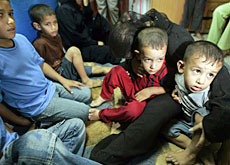Aid official warns of “shocking” Gaza crisis

Switzerland should step up pressure to ensure international humanitarian law is properly respected in the Gaza Strip, says top government official.
For Walter Fust, head of the Swiss Agency for Development and Cooperation (SDC), the situation in the increasingly isolated Palestinian territory is “untenable” and “shocking”.
“This siege policy [in Gaza] has damaging consequences that require a substantially increased international humanitarian response,” Fust told swissinfo on Wednesday at the end of a four-day visit to Gaza.
Aid agencies are increasingly concerned about the plight of Gaza’s 1.4 million people. Gaza has been all but cut off from the outside world since June, when the Islamist militant group, Hamas, seized control of the territory.
In September Israel declared Gaza a “hostile territory” and announced military action, additional restrictions on the movement of people and goods to and from the area, and reductions in the supply of fuel and electricity in response to continued rocket attacks from the Palestinian territory.
Fust, who hadn’t been to Gaza for seven years, said the food situation had deteriorated “considerably”, with 30 per cent of children undernourished.
The situation in hospitals and health centres is also precarious, he noted, with shortages of medicines and medical material.
“Ambulances have such a complicated time passing Israeli checkpoints that patients lives are endangered,” he said.
The costs of basic commodities have risen by 30 per cent over the last six months as a result of the Israeli blockade of the Palestinian territory. According to the United Nations, unemployment in Gaza is around 70-75 per cent and 30 per cent of young people say they want to leave the Strip.
“Domestic violence has also got worse,” said Fust, adding that drug- and arms-trafficking were fuelling violence in general.
Education crisis
Children’s education was also suffering as a result of the ongoing crisis.
“They can no longer get hold of exercise or study books as Israel’s military are blocking the importation of paper, ” said Fust.
He warned that if additional resources were not found, the food programme in [Gaza] schools, which is urgently needed, would not get off the ground.
Some 54 per cent of people living in the territory are under 30 and “we feel it’s important that these young people have a future”, he said. “I feel a substantial increase in the humanitarian engagement by the international community is indispensable.
“Everything must be done to mobilise more funds for Gaza. Aid organisations cannot even cover half of their budget for Palestinian refugees.”
Bilingual school
On Sunday the SDC director inaugurated the new Max Rayne bilingual school in Jerusalem for Arab and Jewish students, which Switzerland has supported to the tune of SFr3.5 million ($2.98 million).
“We have to invest heavily in peace education,” said Fust. “Schools such as Max Rayne could serve as models in the region.”
In a related development, on Wednesday the non-governmental organisation Amnesty International slammed the Islamist militant group, Hamas, and their secular Fatah counterparts for serious human rights abuses in the recent factional clashes in Gaza and the West Bank.
Hamas is accused of “increasingly resorting” to arbitrary detention and torture since its forces took control of Gaza in June. In the West Bank Fatah security personnel are accused of detaining, abducting and abusing hundreds of Hamas supporters, with help from Israel.
According to Amnesty, the factional fighting between Hamas and Fatah caused some 350 deaths in Gaza during the first six months of the year.
swissinfo with agencies
SDC head Walter Fust finished his four-day visit to Gaza on Wednesday. During this time he met Palestinian ministers, United Nations representatives and NGOs.
The SDC’s development cooperation priorities in Gaza and the West Bank are: enhancing prospects for peace, improving living conditions, and promoting viable and sustainable institutions.
Its humanitarian aid focuses on relief services for refugees in the region, as well as in Jordan, Syria and Lebanon. It works with partner organisations, including the United Nations and the International Committee of the Red Cross (ICRC).
The Swiss government’s total planned aid budget for 2007 for the region is SFr22.4 million ($19.1 million).

In compliance with the JTI standards
More: SWI swissinfo.ch certified by the Journalism Trust Initiative












You can find an overview of ongoing debates with our journalists here . Please join us!
If you want to start a conversation about a topic raised in this article or want to report factual errors, email us at english@swissinfo.ch.